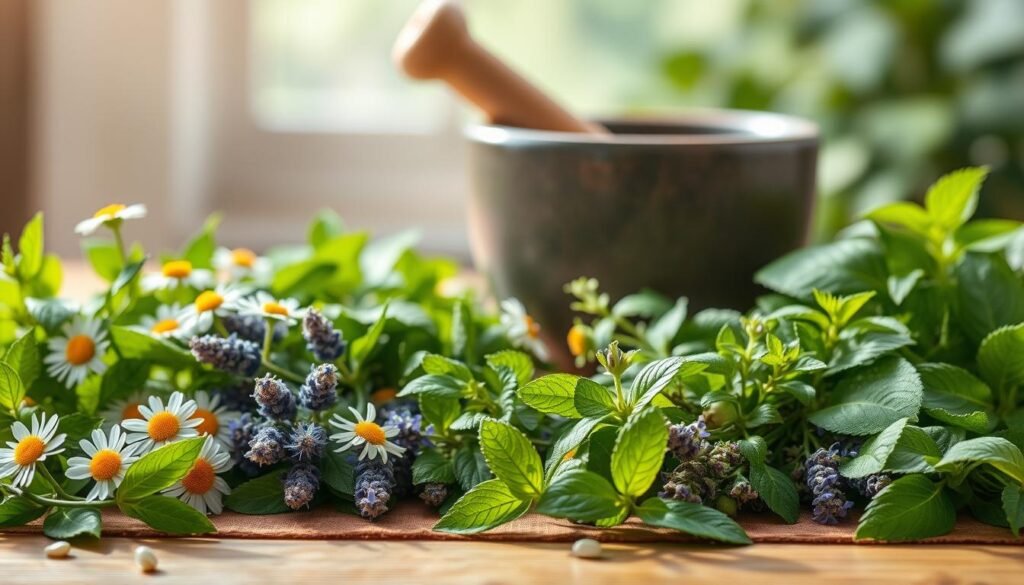Did you know that nearly 80% of Americans experience stress, affecting their mental and physical well-being? In today’s fast-paced world, finding effective ways to manage anxiety is crucial. One natural approach gaining popularity is using herbs for stress relief, offering a calming solution without the side effects of medication.
Natural stress remedies have been used for centuries, providing a gentle yet effective way to alleviate stress. By incorporating these herbs into your daily routine, you can promote relaxation and improve your overall quality of life.
Key Takeaways
- Discover the most effective herbs for reducing stress and anxiety.
- Learn how to incorporate these natural remedies into your daily routine.
- Understand the benefits of using herbs for stress relief.
- Explore the different ways to consume these calming herbs.
- Find out how natural stress remedies can improve your overall well-being.
Understanding Stress and Its Impact on Health
As stress continues to rise, especially among healthcare professionals, understanding its impact is crucial. Chronic stress can have far-reaching consequences on both physical and mental health.
Physical Symptoms of Chronic Stress
Chronic stress manifests in various physical symptoms, including:
- Headaches and migraines: Frequent tension headaches can be a sign of underlying stress.
- Digestive issues: Stress can exacerbate conditions like IBS (Irritable Bowel Syndrome).
- Cardiovascular problems: High blood pressure and heart disease are linked to chronic stress.
- Weakened immune system: Stress can make you more susceptible to illnesses.
Mental and Emotional Effects of Stress
The mental and emotional toll of stress should not be underestimated. It can lead to:
- Anxiety and depression: Chronic stress can trigger or worsen these conditions.
- Mood swings: Stress can cause irritability and mood instability.
- Burnout: Prolonged stress can result in emotional exhaustion.
Understanding these impacts is the first step towards managing stress effectively. In the following sections, we will explore how herbs can play a crucial role in stress relief.
How Herbs Can Help Manage Stress Naturally
Herbs offer a natural approach to managing stress, backed by a rich history of traditional use and growing scientific evidence. With an estimated 35% of Americans reporting the use of at least one herbal medicine, it’s clear that botanical remedies are a popular choice for addressing stress.
The use of herbs for stress relief is grounded in their ability to interact with the body’s physiological systems, promoting balance and well-being. Unlike conventional stress relief methods that might come with side effects, herbal remedies offer a gentler approach.
The Science Behind Herbal Remedies
Herbal remedies work by utilizing the bioactive compounds found in plants, which can influence various bodily systems. For instance, adaptogenic herbs like ashwagandha are known to help the body adapt to stress by modulating the stress response system.
“The adaptogenic properties of certain herbs enable them to help the body resist the damaging effects of stress, promoting overall resilience and well-being.”
The science supporting herbal stress relief is growing, with studies examining the effects of various herbs on stress response, anxiety, and overall mental health.
| Herb | Primary Use | Key Benefit |
|---|---|---|
| Ashwagandha | Stress Relief | Reduces cortisol levels |
| Lavender | Anxiety Relief | Promotes relaxation |
| Chamomile | Sleep Aid | Improves sleep quality |
Advantages of Natural Approaches to Stress Relief
One of the primary advantages of using herbs for stress relief is their natural origin and the lower risk of side effects compared to synthetic drugs. Additionally, herbal remedies can be used in conjunction with other stress management techniques, enhancing their effectiveness.
Key benefits of herbal stress relief include:
- Natural and gentle on the body
- Can be used alongside other stress management techniques
- Diverse range of herbs available, each with unique properties
As individuals seek more holistic approaches to health, the appeal of herbal stress relief continues to grow. By understanding the science behind these remedies and their advantages, individuals can make informed choices about managing stress naturally.

Herbs for Stress Relief – Quick Guide to the Top Choices
Nature has provided us with a variety of herbs that can help alleviate stress and anxiety. These natural remedies have been used for centuries to promote relaxation and well-being. In this quick guide, we’ll explore the top herbal choices for stress relief and how they can be used effectively.
Adaptogens vs. Nervines: Understanding Different Types
Herbs for stress relief can be broadly categorized into two types: adaptogens and nervines. Adaptogens are herbs that help the body adapt to stress, promoting balance and resilience. Examples include ashwagandha and rhodiola. Nervines, on the other hand, are herbs that calm the nervous system, such as lavender and chamomile.
Understanding the difference between these two categories is crucial for selecting the right herb for your specific needs. While adaptogens work on a deeper level to enhance the body’s stress response, nervines provide immediate calming effects.
“The right herbal remedy can make a significant difference in managing stress and promoting overall well-being.”
Research-Backed Herbal Options
Several herbs have been researched for their stress-relieving properties. Here are some of the most effective options:
| Herb | Type | Benefits |
|---|---|---|
| Ashwagandha | Adaptogen | Reduces cortisol levels, enhances resilience |
| Lavender | Nervine | Promotes relaxation, improves sleep |
| Passionflower | Nervine | Calms anxiety, reduces restlessness |
These herbs can be consumed in various forms, including teas, tinctures, and supplements. It’s essential to choose high-quality products to ensure efficacy.
By incorporating these herbs into your daily routine, you can find natural relief from stress and anxiety. Always consult with a healthcare professional before starting any new herbal remedy.
Ashwagandha: The Ancient Stress-Fighting Adaptogen
In the realm of herbal remedies, ashwagandha stands out as a potent adaptogen for stress relief. This ancient herb has been a cornerstone in traditional Indian medicine for centuries, valued for its ability to help the body adapt to stress.

Benefits and Clinical Evidence
Ashwagandha has been extensively studied for its stress-relieving properties. Research has shown that it can significantly reduce cortisol levels, improve sleep quality, and enhance overall resilience to stress. Clinical trials have demonstrated its efficacy in reducing anxiety and stress in individuals with chronic stress conditions.
The benefits of ashwagandha are multifaceted, making it a versatile herb for managing stress. It not only helps in reducing cortisol levels but also improves cognitive function and enhances the body’s ability to handle stress.
Recommended Dosage and Forms
Ashwagandha is available in various forms, including capsules, powders, and tinctures. The recommended dosage can vary depending on the form and individual needs. Typically, a dosage of 300-500 mg per day is considered effective for stress relief.
When choosing an ashwagandha supplement, it’s essential to look for products that are standardized to contain a specific percentage of withanolides, the active compounds responsible for its adaptogenic effects.
Lavender and Chamomile: Gentle Yet Effective Remedies
For those seeking natural stress remedies, lavender and chamomile stand out as gentle yet effective options. These herbs have been used for centuries to promote relaxation and reduce anxiety.
Multiple Applications for Anxiety Relief
Lavender and chamomile are versatile herbs that can be used in various forms to alleviate anxiety. They can be consumed as teas, tinctures, or supplements, or used topically in essential oils.
Lavender is known for its calming effects and is often used in aromatherapy to promote relaxation. Chamomile, on the other hand, is a natural sedative that can help with sleep disorders.
- Lavender tea can be consumed before bed to promote a good night’s sleep.
- Chamomile essential oil can be used in a diffuser to create a calming atmosphere.
- Both herbs can be used in bath salts for a relaxing soak.
How to Use These Herbs for Maximum Benefit
To get the most out of lavender and chamomile, it’s essential to use them correctly. Here are some guidelines:
| Herb | Form | Recommended Dosage |
|---|---|---|
| Lavender | Tea | 1 cup before bed |
| Chamomile | Essential Oil | 5-7 drops in a diffuser |
| Lavender | Tincture | 20-30 drops, 3 times a day |
By incorporating these herbs into your daily routine, you can effectively manage stress and anxiety. Whether you prefer teas, tinctures, or essential oils, lavender and chamomile are natural stress remedies that can provide relief.
Lemon Balm and Passionflower: Calming the Nervous System
Lemon balm and passionflower, two herbs with a long history of use in traditional medicine, offer a natural approach to calming the nervous system. These herbs have been utilized for centuries to address various health concerns, including anxiety and sleep disturbances.

Benefits for Sleep and Daytime Anxiety
Lemon balm and passionflower are recognized for their calming properties, which can be particularly beneficial for individuals experiencing sleep disturbances and daytime anxiety. Research has shown that these herbs can help reduce stress levels, promote a sense of calm, and improve sleep quality.
The benefits of using lemon balm and passionflower for sleep and anxiety include:
- Improved sleep quality through the regulation of sleep patterns
- Reduced anxiety levels, promoting a sense of calm during the day
- Enhanced overall well-being by addressing the root causes of stress and anxiety
As noted by herbal experts, “The combination of lemon balm and passionflower can be particularly effective in managing stress and anxiety due to their complementary actions on the nervous system.”
Preparation Methods and Dosage Guidelines
Both lemon balm and passionflower can be prepared in various forms to suit individual preferences and needs. Common preparation methods include teas, tinctures, and capsules.
For optimal benefits, the following dosage guidelines are recommended:
| Herb | Preparation Method | Recommended Dosage |
|---|---|---|
| Lemon Balm | Tea | 1-2 teaspoons dried leaves in 8 oz boiling water, steep for 5-10 minutes, 3 times a day |
| Passionflower | Tincture | 20-40 drops, 3 times a day |
It’s essential to consult with a healthcare professional before starting any new herbal regimen, especially if you’re already taking medications or have underlying health conditions.
Powerful Adaptogens: Rhodiola, Holy Basil, and Reishi
In the quest for stress relief, adaptogenic herbs like rhodiola, holy basil, and reishi have emerged as powerful allies. These herbs have been used for centuries in traditional medicine to enhance the body’s resilience to stress.
Building Resilience to Stress
Adaptogens work by influencing the body’s stress response system, helping to balance the production of stress hormones like cortisol. Rhodiola rosea, for instance, is known for its ability to reduce fatigue and improve mental performance under stress. Holy basil, revered for its sacred status in Hindu tradition, is recognized for its anti-anxiety properties and its capacity to protect against stress-induced damage.
Reishi mushrooms have been used in traditional Chinese medicine for their wide-ranging health benefits, including their ability to calm the mind and reduce stress. By incorporating these adaptogens into one’s daily routine, individuals can potentially enhance their resilience to stress and improve overall well-being.
When to Choose Adaptogenic Herbs
Adaptogenic herbs are particularly useful during periods of heightened stress or when facing challenging situations. They can be used to prevent the negative impacts of stress on the body and mind. For example, during exam periods, work-related stress, or significant life changes, adaptogens like rhodiola and holy basil can provide support.
It’s also worth noting that while adaptogens are generally considered safe, it’s essential to consult with a healthcare professional before adding them to your regimen, especially if you’re already taking medication or have underlying health conditions.
“Adaptogens offer a natural way to enhance resilience and promote well-being in the face of stress.”
By understanding when and how to use these powerful adaptogens, individuals can take a proactive approach to managing stress and enhancing their overall quality of life.
Preparation Methods: Teas, Tinctures, and Supplements
To effectively utilize herbal remedies for stress, it’s essential to understand the different preparation methods available, such as teas, tinctures, and supplements. Each method has its unique benefits and applications.
Making Effective Herbal Teas
Herbal teas are a soothing and effective way to consume stress-reducing herbs. The process involves steeping the herbs in hot water to release their active compounds. For optimal results, use high-quality, dried herbs and adjust the steeping time according to the herb’s characteristics.
For example, delicate herbs like chamomile require a shorter steeping time (5-7 minutes), while roots like ginger may need longer (10-15 minutes). Experimenting with different steeping times and herb combinations can help you find the perfect blend for your stress relief needs.
Understanding Extract Potency and Quality
Tinctures and supplements offer more concentrated forms of herbal remedies. When choosing tinctures, look for products with clear labeling indicating the extraction method and herb concentration. This information is crucial for ensuring you’re getting a high-quality product.
| Preparation Method | Benefits | Considerations |
|---|---|---|
| Teas | Soothing, easy to prepare, and customizable | May require daily preparation, variable potency |
| Tinctures | Concentrated, convenient, and precise dosing | May have a strong taste, requires careful selection of product |
| Supplements | Convenient, standardized dosages, and often combined with other nutrients | Quality varies by brand, potential interactions with medications |
When selecting any herbal remedy, it’s crucial to choose products from reputable sources to ensure quality and efficacy. By understanding the different preparation methods and their benefits, you can make informed decisions about your stress relief routine.
Sourcing Quality Herbs and Products
Sourcing high-quality herbs is crucial for those seeking natural stress remedies. The quality of herbal products can vary significantly depending on sourcing and manufacturing practices. Ensuring that the herbs you choose are of high quality is essential for their effectiveness in stress relief.
What to Look for in Herbal Supplements
When selecting herbal supplements, several factors should be considered to ensure you’re getting a quality product. Look for products that are labeled with the botanical name of the herb, as this ensures you’re getting the correct herb. Additionally, check for information on the extraction method and ratio, as this can impact the product’s potency.
It’s also crucial to check for any third-party certifications, such as NSF International or the National Science Foundation, which verify the product’s quality and purity. Be wary of products with vague labeling or those that make unsubstantiated claims about their benefits.

Trusted Brands and Certification Standards
Choosing a trusted brand is vital when it comes to herbal supplements. Reputable brands will often provide transparent information about their sourcing and manufacturing processes. Look for brands that adhere to Good Manufacturing Practices (GMP) and have certifications from organizations like the USDA Organic or Non-GMO Project Verified.
Some well-regarded brands in the herbal supplement industry include those that participate in third-party testing and certification. When in doubt, consult with a healthcare professional or a qualified herbalist to guide your selection.
Creating Your Personalized Herbal Stress Relief Routine
To maximize the benefits of stress management herbs, it’s essential to create a customized routine. By incorporating the right herbs at the right time, you can enhance their effectiveness and improve your overall stress resilience.
Morning, Afternoon, and Evening Protocols
Creating a routine involves understanding when to use different herbs for optimal benefit. Here’s a general guideline for incorporating stress management herbs into your daily routine:
- Morning: Start with adaptogenic herbs like Ashwagandha or Rhodiola to boost energy and resilience.
- Afternoon: Use calming herbs such as Chamomile or Lemon Balm to manage mid-day stress.
- Evening: Opt for relaxing herbs like Lavender or Passionflower to promote a restful night’s sleep.
Combining Herbs with Other Stress Management Techniques
For a comprehensive stress management plan, consider combining herbal remedies with other techniques. Some effective methods include:
- Meditation and mindfulness practices to calm the mind.
- Physical exercise, such as yoga or walking, to reduce physical tension.
- Deep breathing exercises to promote relaxation.
- Journaling or expressive writing to process emotions.
By integrating these techniques with your herbal stress relief routine, you can achieve a more balanced and resilient response to stress, utilizing the best herbs for stress effectively.
Conclusion
By incorporating herbs into your daily routine, you can effectively manage stress and improve overall well-being. This herbal stress relief guide has highlighted the benefits of various herbs, including Ashwagandha, Lavender, and Chamomile, in reducing anxiety and promoting relaxation.
These natural remedies offer a holistic approach to stress management, allowing you to take control of your mental and emotional health. By understanding the different types of herbs and their preparation methods, you can create a personalized stress relief routine that suits your needs.
As you explore the world of herbal stress relief, remember to source high-quality products and consult with a healthcare professional if necessary. By combining these natural remedies with other stress management techniques, you can achieve a balanced and healthy lifestyle.

